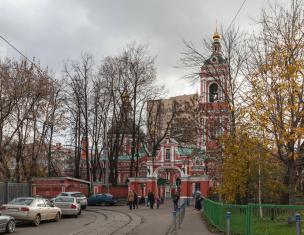“Mtsyri” is one of Lermontov’s most famous and widely read works, and when studying it, the question inevitably arises: what genre does it belong to? The genre of Lermontov’s “Mtsyri” is defined as a poem.
The genre of the poem is considered one of the most controversial in literature, since it successfully combines two literary genres: epic and lyric. In the poem “Mtsyri”, in addition to the lyrical beginning, there is also a dynamic plot, so it can be classified as a lyric-epic poem.
Despite the complexity of this genre, Lermontov appeals
to him while still very young, at the age of 16-17, sketches of his first poems appear in his diary. In total, the poet wrote about a dozen poems. Some of them, unfortunately, remained in drafts and drafts. “Mtsyri” is considered one of the most successful poems; from its example one can see how much Lermontov developed and honed the genre of the poem in Russian literature.
The peculiarities of the poem “Mtsyri” by Lermontov are that this poem is romantic and, therefore, has a number of features characteristic of this genre.
This is an action-packed plot, an image in the foreground of an unconventional hero and his collision with the outside world, the severity of experiences. We can find all these features in “Mtsyri,” and its plot itself—the hero’s escape to freedom—is already typical of romanticism. However, at the same time, something new that Lermontov introduced is noticeable here: if in traditional romantic poems the hero seeks to escape from society, here everything happens the other way around. Mtsyri's escape is, in essence, an escape to people, a return to his native home, which he was deprived of.
The theme of escape is one of the favorites in the poet’s work (“Boyarin Orsha”, “Confession”), but it is in “Mtsyri” that it is revealed in all its fullness.
Another non-standard feature of the poem is the almost complete absence of a love line in it, on which the plot is often based in romantic works. Since “Mtsyri” belongs to the genre of a romantic poem, the reader is waiting for his love story. But the center of the narrative shifts to other events (Thunderstorm, battle with the leopard). And the Georgian girl, whom Mtsyri sees only once, is indicated in passing and by hint. So, Lermontov writes a romantic poem without a love conflict.
Finally, consider the technique used by the poet for greater disclosure inner world hero. For this, Lermontov chooses the genre of not just poems, but confessional poems. This genre, familiar to romantic literature, also acquires new features. The confession of the hero merges with the confession of the author himself. Mtsyri, who gave his life for the ghost of freedom, is much closer to Lermontov than his own cautiously indifferent environment. The fire that burns the hero also torments the author, which is why the poem turns out to be so sincere.
Therefore, the genre of Lermontov’s work “Mtsyri” can be defined as a Romantic confessional poem.
Some of the features in it will be classic, recognizable, while some will be new, introduced by the author. It is thanks to this contrast that an individually authored, truly brilliant work is created.
Other works on this topic:
- “Mtsyri” is considered one of Lermontov’s successful poems; it can be considered an example of Russian romantic poetry. You can draw a parallel between the life of Mikhail Yuryevich himself and the hero of the work....
- “Mtsyri” is a lyrical poem. It primarily depicts the complex experiences of the hero, rather than external events. Lermontov chooses the form of a confessional poem, since the story is from...
- “Mtsyri” is a lyrical poem. It primarily depicts the complex experiences of the hero, rather than external events. Lermontov chooses the form of a confessional poem, since the story...
- One of best works I consider his poem “Mtsyri”. This work most strongly reflects the author’s literary and life quests, his difficult thoughts, philosophical questions,...
- Poem by M.Yu. Lermontov’s “Mtsyri” as a romantic work I. Introduction Characteristics of romanticism and its most important properties: an exceptional hero, often mysterious; extraordinary fate, special circumstances, sublime motives...
- The poem “Mtsyri” is a typically romantic work (the unity of man with nature - the scene of a thunderstorm and the escape from the monastery; romantic love - a meeting with a Georgian woman; struggle -...
- The poem “Mtsyri” is the greatest work of Russian romantic literature. The main character of the poem is a man who, according to the critic V. G. Belinsky, has a “mighty spirit”, “fiery soul”...
A few months later, Arsenyeva transported the ashes of her grandson to Tarkhany. Observations on the portraits of M.Yu. Lermontov. Lesson topic message. What is a storm? Lermontov's childhood. Tragic death. Boarding school education. Lesson objectives. M.Yu. Lermontov's poem "Sail". The waves play - the wind whistles, and the mast bends and creaks. Expressive reading. The sail is the human condition. The poet's parents. Analysis of the poem.
“Lermontov “Autumn”” - Summer is over. Plowman - plow, plow. The young poet paints a picture of autumn nature. Find and read stanza 3. It is important to be able to notice the beauty of the surrounding nature. Vocabulary work. What is observed around: a cheerful, energetic life or peace. The drooping ate - sad. Goals. M.Yu. Lermontov "Autumn". Why do you think the greenery is shown as “dark”. Secondary reading. Now we will read this poem stanza by stanza.
“M.Yu. Lermontov “Borodino”” - What age is the narrator. The roar of battle. Childhood. Oil Paintings. Pushkin's successor. Borodino. What feeling is imbued with the poem “Borodino”. Characteristics of the narrator. We read and think. Rapid movement. Damask steel sounded, buckshot screamed. The best. Musyu. Drawings. Ashes of Lermontov. Poem. M.Yu Lermontov. Army of the French Emperor Napoleon. First poems. Who talks about the war?
“The poem by M.Yu. Lermontov “Mtsyri”” - Experts in the poems of M.Yu. Lermontov. Image of Mtsyri. A question about erudition. Fill the table. Poetics of the title of the poem "Mtsyri". The plot of "Mtsyri". Lyric poem by M.Yu. Lermontov "Mtsyri". Stylistic features"Mtsyri". Creative task. Genre revolution. Theoretical warm-up. The pinnacle of Lermontov's mastery. Literary pyramid. Genre "Mtsyri". Creative question. A journey into history. Literary levels.
“Pushkin and Lermontov “Prophet”” - What is Lermontov’s prophet like. Who acts as prophets in the poems of Pushkin and Lermontov. “Prophet” by M.Yu. Lermontov. Poet and poetry in the lyrics of M.Yu. Lermontov. Lesson objectives. Reptile underwater passage. How the image of the poet-prophet is created by Pushkin and Lermontov. Poetry in the era of Lermontov. The fate of Russian poets. “Prophet” by A.S. Pushkin.
“Lermontov’s poem “Borodino”” - Poem “Mtsyri”. Kutuzov. Bogatyrs. Vocabulary work. History of the creation of the work. Russian soldiers. Mikhail Lermontov. Dormant waters. Borodino. Russian losses. Author's biography. School of Guards Junkers.
“Mtsyri” is one of Lermontov’s most famous and widely read works, and when studying it, the question inevitably arises: what genre does it belong to? The genre of Lermontov's "Mtsyri" is defined as a poem.
The genre of the poem is considered one of the most controversial in literature, since it successfully combines two literary genres: epic and lyric. In the poem "Mtsyri", in addition to the lyrical beginning, there is also a dynamic plot, so it can be classified as a lyric-epic poem.
Despite the complexity of this genre, Lermontov turned to it while still very young; at the age of 16-17, sketches of his first poems appeared in his diary. In total, the poet wrote about a dozen poems. Some of them, unfortunately, remained in drafts and drafts. “Mtsyri” is considered one of the most successful poems; from its example one can see how much Lermontov developed and honed the genre of the poem in Russian literature.
The peculiarities of the poem “Mtsyri” by Lermontov are that this poem is romantic and, therefore, has a number of features characteristic of this genre. This is an action-packed plot, an image in the foreground of an unconventional hero and his collision with the outside world, the severity of experiences. We can find all these features in “Mtsyri,” and its plot itself—the hero’s escape to freedom—is already typical of romanticism. However, at the same time, something new that Lermontov introduced is noticeable here: if in traditional romantic poems the hero seeks to escape from society, here everything happens the other way around. Mtsyri's escape is, in essence, an escape to people, a return to his native home, which he was deprived of.
The theme of escape is one of the favorites in the poet’s work (“Boyarin Orsha”, “Confession”), but it is in “Mtsyri” that it is revealed in all its fullness.
Another non-standard feature of the poem is the almost complete absence of a love line in it, on which the plot is often based in romantic works. Since “Mtsyri” belongs to the genre of a romantic poem, the reader is waiting for his love story. But the center of the narrative shifts to other events (thunderstorm, battle with a leopard). And the Georgian girl, whom Mtsyri sees only once, is indicated in passing and by hint. So, Lermontov writes a romantic poem without a love conflict.
Finally, let’s look at the technique used by the poet to further reveal the hero’s inner world. For this, Lermontov chooses the genre of not just poems, but confessional poems. This genre, familiar to romantic literature, also acquires new features. The confession of the hero merges with the confession of the author himself. Mtsyri, who gave his life for the ghost of freedom, is much closer to Lermontov than his own cautiously indifferent environment. The fire that burns the hero also torments the author, which is why the poem turns out to be so sincere.
Mikhail Yuryevich Lermontov often discussed the topic of the Caucasus in his work. We can say that it became fundamental for most of his works. He dedicated many poems to the Caucasus and its nature, the poems “Demon” and “Mtsyri”, as well as the famous novel “Hero of Our Time”.
“Mtsyri” was published in 1840, in a collection of poems by the author. This work is a kind of generalization of the writer’s work, his own thoughts and feelings that he endowed with the main character.
Lermontov turned to the genre of the poem more than once throughout his life, but, unfortunately, not always successfully. Thus, some of his begun poems remained only sketches. However, having finished “Mtsyri”, he showed that his skill in this genre had significantly improved, he literally honed the skill of writing lyrical poems. At the same time, many features in the work remain typical of the era of romanticism in literature, but there are also atypical elements that the author introduced into the genre.
So, typical of romanticism, is main character- a young man who does not know how and does not want to live in captivity, who is ready to escape for a few days in freedom. This is a rebellious and rebellious hero, ready to go against society - this is exactly what we see in most of the works of this period.
Also, the young man is very emotional and vulnerable; all his experiences and inconsistency with society are another feature of a romantic work.
Finally, acceptance of death. We see that the young man values freedom so much that he is ready to exchange his life for a couple of days that he can live in freedom. That is, he is not at all afraid of death; on the contrary, it is salvation for his soul, which does not want to remain in a cage (in this case, in a monastery).
Now let's talk about the atypical features of the poem that were not characteristic of romantic works.
- Firstly, there is a complete lack of a love story. The reader expects that some kind of love line is about to appear, but there is none. Instead, the author takes the reader to other events that help fully develop the character of the hero. For the author this is much more important.
- Secondly, everything in the poem is logical, consistent, and at the same time there is no mysticism or understatement. But the works of romanticism necessarily contained some, even the smallest, secret or mysticism. In poems, the authors often left the right for the reader to think out some points.
So, the genre features of the poem “Mtsyri” allow us to conclude that it was in it that the author revealed his full potential, expressed all his experiences, comparing himself with the main character. At the same time, he was not afraid to introduce into his creation features that were not typical for poems of the romantic era, and thereby made his work special not only in terms of plot, but also in genre.
All of Lermontov’s work is permeated by the image of the Caucasus. Proud free people, majestic and powerful nature impressed the poet from a young age, which is already evident in his early poems. He did not ignore one of the main trends in literature of the first half of the 19th century - the depiction of a romantic hero. And these two main themes came together in one of the author’s best works - the poem “Mtsyri”.
For this work, the historical context is incredibly important - the events that led to the captivity of Mtsyri. In Russia, the first half of the nineteenth century was the era of the conquest of the Caucasian lands. This is not only the annexation of territories to the Russian Empire, but also the subordination of mountain peoples to Orthodoxy and tsarist power. It is quite possible to imagine how a Georgian boy, left orphaned after another battle, ends up being raised in Orthodox monastery. History knows such examples: this was the childhood of the artist P. Z. Zakharov. There are suggestions that Lermontov based the plot on the story of a monk he met on the military roads of Georgia. The author also turned to local folklore, as evidenced by the scene of the fight with the leopard: this episode was based on a folk song about a young man and a tiger.
The poem "Mtsyri" was written by Lermontov in 1839. It was edited a lot to avoid censorship. Basically, fragments in which freedom was particularly praised or anti-Orthodox motives were heard were removed.
What is the work about?
The action in the book takes place in the Caucasus. At the beginning of the poem, Lermontov reproduces the backstory of how the main character ended up in the monastery: a Russian general was carrying a captive child. The boy was very weak, and a monk sheltered him in his cell, thereby saving his life. The essence of “Mtsyri” is to express his protest against this salvation in captivity, which not only destroys him, but also torments him.
The main part of the poem is the confession of the main character. This is what it says: the prisoner admits that he has been unhappy all these years, the walls of the monastery are tantamount to a prison for him, he cannot find understanding here. In 3 days outside captivity, a young man lives his entire life.
Firstly, the young man remembers his childhood years and his father. During this period, he feels his purpose, realizes what kind of blood flows in his veins.
Secondly, he meets a young Georgian woman who was walking to fetch water. This might be the first girl he's seen in years.
Thirdly, he has a fight with a leopard. The hero instinctively fights the beast, because within the walls of the monastery he could not be taught martial arts. The feeling of danger awakened his true warlike spirit in him, and the young man defeats the enemy.
Exhausted and wounded, by the end of the third day of wandering, the fugitive is forced to bitterly admit to himself: not knowing where to go, he made a circle and returned to his ill-fated prison - the monastery. Dying, he bequeaths to bury himself in the garden where the acacia tree blooms.
Genre and direction
It is difficult to imagine the era of romanticism in literature without the genre of the poem. “Mtsyri” is included in the thematic group of Lermontov’s works about the romantic hero. The previously written “Boyar Orsha” and “Confession” anticipated the poem about an escaped novice.
A more precise definition of the genre “Mtsyri” is a romantic poem. One of characteristic features the work is a reflection of the hero's ideas. The young man strives for freedom; for him, will is the goal of life, the main happiness. For the sake of his dream, he is ready to sacrifice his life. All this allows us to consider Mtsyri a romantic hero.
It was not only Lermontov who developed such a special genre of poem in his work. First of all, we can compare “Mtsyri” with the poem by K.F. Ryleev “Nalivaiko”, the plot of which dates back to the era of the Cossacks’ struggle for independence.
Another feature of the romantic poem is its confessional nature, which is also characteristic of “Mtsyri”. Confession, as a rule, contains a story about the hopes and dreams of the hero, his confessions, sometimes unexpected. Revelation reflects the strength of his spirit, his character.
The main characters and their characteristics
To determine the image of the main character, it is necessary to take into account what the word “mtsyri” means. There are two meanings in Georgian: novice and stranger. Initially, Lermontov wanted to call the poem “beri,” which means monk in Georgian, but it was “mtsyri” that maximally reflects the essence of the character.
Why did Mtsyri escape? He was not tortured in the monastery, nor was he forced to do backbreaking work. However, there were reasons because of which the hero suffered. Firstly, the young man’s dream was to find a loved one, even if not a relative, but one nation, one blood. Growing up as an orphan, he dreamed of feeling at least for a moment the warmth of an understanding soul. Another goal of the hero is will. He cannot call the years spent in the cell life; only in freedom was he able to realize who he really is.
It is important to note that, despite the failure, the character of “Mtsyri” does not complain about fate, he does not curse himself, but confidently accepts this test and even rejoices that his gloomy life was brightened by these three days.
It is impossible to create the image of a romantic hero without the motive of love. This goal is conveyed by the mention in the confession of a young Georgian woman, when the young man himself admits: “My ardent thoughts // Are confused...”. and his thoughts are described in detail by us in the essay.
In his fight with the leopard, the hero showed incredible courage and perseverance, the risk and energy of battle awakened the spirit of his ancestors in him, but young man not destined to find freedom and happiness. This is the author’s embodiment of the theme of rock in the image of Mtsyri.
Themes
- Freedom. This theme permeates the poem on two levels. The first is global: Georgia is subordinate to the Russian Empire, the second concerns the protagonist of the poem personally: he dreams of a free life. Mtsyri does not want to come to terms with his captivity in the monastery and escapes. But he cannot escape his fate, and three days later the young man, having made a circle, returns to the hated walls.
- Loneliness. One of the reasons for the escape was the search for people close in spirit and blood. Mtsyri is alone among the clergy; he rather feels his kinship with nature than with them. The young man grew up as an orphan, he is a stranger to both worlds: both to the monastery and to the mountaineers. For him, the temple is captivity, and, as his escape showed, the novice was not fit for independent life.
- War. The hero "Mtsyri" did not participate in battles, but was born for them. His father was a courageous defender of his people, but his son became a victim of war. It was she who left the boy an orphan, it was because of her that he did not know family, affection, a happy childhood, but only a monastery and prayers.
- Love. The unfortunate exile does not know what a family is, he has no friends, all his bright memories are focused on his childhood. But a meeting with a young Georgian woman awakens new feelings in the hero. Mtsyri understands that happiness is possible even now, if only he could find the right path, but life decreed otherwise.
Issues
The problem of personal oppression always worried Lermontov. The poet passionately loved the Caucasus, visited there as a child, and was sent there to war several times. Fulfilling his duty to his homeland, the writer fought and fought courageously, but at the same time, deep down in his soul he sympathized with the innocent victims of this political campaign. Mikhail Yuryevich expressed these experiences in the image of the main character of the poem. It would seem that Mtsyri should be grateful to the general, because by his grace he did not die as a child, but he cannot call his stay in the monastery life. Thus, by depicting the life of one, the author showed the fate of many, which allowed readers to take a completely different look at Caucasian wars. Thus, the creator touched upon both political and social problems arising from any violent action by the state. Officially, only soldiers fight, but in reality, civilians are involved in the bloody cycle, whose families and destinies are a bargaining chip for the implementation of His Majesty’s large-scale plans.
Idea of the work
The poem is built on the antithesis of freedom and captivity, but in the context of the era when Lermontov lived and worked, these concepts had a much broader meaning. It is no coincidence that, fearing censorship, the poet independently edited and crossed out some fragments. The unsuccessful escape of the young man can be seen as an allegory for the December Uprising: the captivity of the monastery - the oppression of the autocracy, the attempt to free himself doomed to failure - the performance of the Decembrists. Thus, the main idea in “Mtsyri” was encrypted and hidden from the authorities so that readers could find it between the lines.
This is how Lermontov responds in the poem not only to the problem of the conquest of the Caucasian peoples, but also to the events of 1825. The author gives the hero not only courage, endurance and a rebellious character, the young man is noble, despite his sad fate, he does not hold a grudge against anyone. This is the meaning of “Mtsyri” - to show the rebellion of the soul without evil and thirst for revenge, a pure, beautiful and doomed impulse, which was the Decembrist uprising.
What does it teach?
The poem makes you think about the fact that any military victory also has its downside: Georgia was annexed by Russia in 1801, but not only the army suffered, but also civilians, innocent children, like the main character “ Mtsyri". The main idea in the poem “Mtsyri” is humanistic: this should not happen again.
Lermontov calls on you to fight and resist fate to the end, and never lose hope. And even in case of failure, do not grumble about life, but courageously accept all trials. Since the poet has endowed his character with all these qualities, the reader perceives him, despite the unsuccessful and spontaneous escape, not as an unfortunate victim, but as a true hero.
Criticism
The literary world enthusiastically accepted the poem “Mtsyri”. Lermontov began to be showered with praise for his creation even before the work was published. For example, A. N. Muravyov recalls the author reading a book he had just written: “...no story has ever made such a strong impression on me.” S.T. Aksakov in “The History of My Acquaintance with Gogol” writes about the author’s wonderful reading of “Mtsyri” at Gogol’s name day in 1840.
The most authoritative critic of that time, V.G. Belinsky valued this work very highly. In his article about the poem “Mtsyri”, he emphasizes how well the poet chose the size and rhythm and compares the sound of the poems with the blows of a sword. He sees in the book a reflection of Lermontov's personality and admires the depiction of nature.
Interesting? Save it on your wall!







